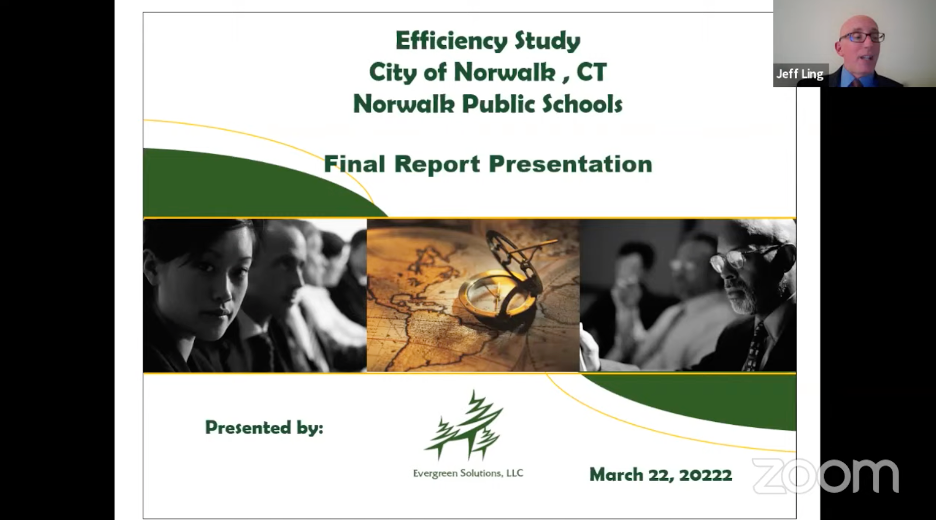Efficiency Study Outlines $9 Million in Net Savings for Norwalk
An efficiency study for the City of Norwalk and its public school district found about $30 million in savings—but also about $21 million in areas that needed investment.

A joint efficiency study that reviewed operations of both the city and school district found a potential $30 million in savings, but also about $21 million in needed investments.
Evergreen Solutions LLC, the company who conducted the study, presented an overview of its findings at the Common Council meeting this week.
The study’s purpose was to “ensure that all programs, operations, and the structure of the City and Norwalk Public Schools are operating at maximum efficiency, creating the most good for all of its citizens.” This meant not only finding areas to save money, according to Evergreen Solutions’ president Jeff Ling, but finding ways to redirect resources, better communicate, and work together.
Main Themes
One overarching issue noted was that the “discord between the city and Norwalk Public Schools regarding the budget is unproductive and infighting has resulted in a serious breakdown in communication.” The consultant recommended opening the lines of communication between the two earlier in the process and sharing more information with each other.
Another big issue was the state of the city’s technology resources.
“The lack of resources, staffing, and citywide planning for technology is negatively impacting every department, program, and function in the city,” the report noted.
Besty Ressel of Evergreen Solutions, when asked what would be a priority for reinvestment in the city, said “technology, technology, technology.”
The third “cross-cutting” issue was that there were huge facilities needs, particularly on the school side, which based on a 2021 Facility Assessment, has more than $430 million worth of repairs.
Notes and Findings
The study also attempted to highlight both areas that are doing well and areas that needed work. On the city side, some of the findings included:
- Administration: praise for restructuring the city with “chiefs” to lead different departments and moving to an online permitting system; a need to establish a communications office that also oversees customer service, centralize the Freedom of Information Act requests, digitize archived records, and revise the city charter.
- Financial Management: praise for maintaining the city’s AAA bond rating and having a high rate of tax collection; a need to amend budget and purchasing approvals, develop a robust grants management program, and move to a bi-weekly system for issuing checks.
- Human Resources: a need to hire more staff and consolidate employee policies.
- Community Services: praise for collaborative efforts, particularly with the school district and establishing programs, such as the Family Navigator Program; and a need to reorganize all of the programs and functions under three main areas.
- Public Safety: a need to reduce fire and police overtime, establish a plan to streamline hiring and training, modernize some procedures, and address scheduling practices.
- Economic and Community Development: praise for maintaining detailed records and organization—particularly efforts to digitize records; a need to prioritize and address the $17 million grant backlog in Transportation, Mobility, and Parking grants, and development policies to guide the overlapping work of TMP and Public Works.
- Operations and Public Works: praise for conducting parks and facilities maintenance efficiently and providing engineering services to the whole city; a need to clarify the roles and responsibilities of each service area as they overlap; and monitor permit workload.
- Information Technology: praise for doing their work while understaffed and under-resourced; a need to address lack of staff, including hiring a chief information officer and filling the senior applications manager and chief information security officer positions.
The report found about $30 million in savings, of which at least $12 million should be reinvested in technology, Ressel said.
“That’s how critical we think it is,” she said.
On the school-side, the findings included:
- Administration and Management: praise for implementing a comprehensive strategic plan and offering Board of Education members opportunities for professional growth; a need to eliminate redundancies and reduce legal costs. The study calls for eliminating the positions of chief of staff and communication, communication manager, and executive assistant and reorganizing communication functions under the deputy superintendent.
- Financial Management: praise for tracking and maximizing grant funding opportunities and establishing controls of purchases made through the P-Card payment system; a need to centralize all student activity fund transactions and better track all capital assets.
- School Operations: praise for collaborating with the health department to get through COVID, using custodian floaters to keep the schools clean, and converting buses from diesel to propane; a need to incorporate maintenance recommendations into workflow and outsource facilities services to better do preventative maintenance.
- Human Resources: praise for working to market open opportunities to teachers and staff members to stay ahead of staffing needs; need to hire at least one more employee to reduce the current workload.
- Information Technology: praise for providing students with devices during the pandemic and integrating technology instruction into daily lessons; a need to increase staffing to support this work and develop a three-year education technology plan.
- Education Operating Efficiency: The consultants noted that they were not supposed to address instructional areas related to curriculum, but they were asked to look at “education operating efficiency” or how staff was being used. Under this, they recommended reallocating the district’s paraprofessionals to better meet the needs of students. For example, instead of having paraprofessionals in core subject areas, the study recommended having more specialized paraprofessionals to support bilingual students.
The plan is to utilize this study to guide both current and future budget discussions. The Board of Education will meet on Thursday, March 31 at 6 p.m. to discuss and review the results of this study collectively.



